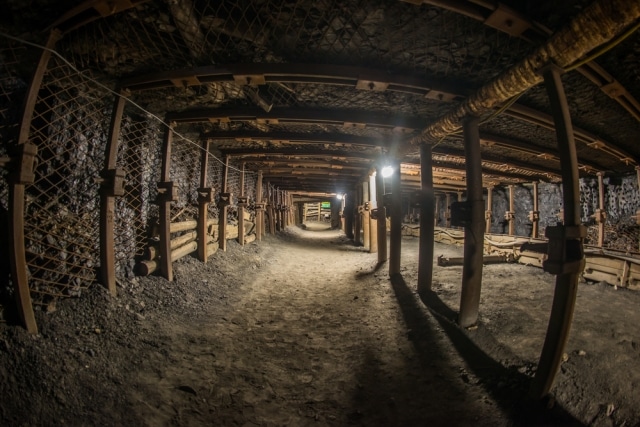This week’s indictment of former Massey Energy CEO, Don Blankenship, was as much a political turning point for West Virginia as it was a moment of reckoning economically for the coal industry writ large. It marked the wane of one of America’s last great robber barons and yet another ominous warning for the country’s dirtiest and deadliest of fossil fuels.
The decision represented a political shot across the bow by a smart, dogged and politically ambitious US attorney, R. Booth Goodwin II. For several years now, Goodwin has systematically worked his way up Massey’s hierarchy, convicting not only low-level supervisors, but also executives higher and higher within the corporate hierarchy. Goodwin has based his prosecutions on conspiracy charges rather than on violations of specific health and safety regulations, which means he can reach further up into the corporate structure.
Goodwin’s pursuit of Blankenship was politically daring — and, if the indictment is to be trusted — based on solid evidence. But it was also a welcome development for the state’s democrats since for over a decade Blankenship had single-handedly dismantled the mine workers union and bank-rolled a resurgent GOP movement in the state, altering the make-up of the state Supreme Court and funneling funds to astro-turf 501c drives for pet issues like “tort reform”.
More than anything, though, the indictment was a small vindication for the families of the 29 men who died at the Upper Big Branch mine on April 5, 2010 in the worst explosion of the past 40 years. But the incident, a range of investigators concluded, was less an accident and more the outcome of deliberate wrongdoing by Massey.
“A company that was a towering presence in the Appalachian coal fields operated its mines in a profoundly reckless manner,” an investigation panel concluded in a May, 2011 report to the governor, “and 29 coal miners paid with their lives for the corporate risk taking.”
The disaster at the Upper Big Branch was labeled “entirely preventable” by the federal Mine Safety and Health Administration, which investigated the accident and found that the explosion was caused by “systematic, intentional and aggressive efforts” to conceal, rather than fix, hazards.
Amid public pressure, Blankenship retired in 2010, relinquishing control of the company he ran for 28 years. He walked away with a retirement package worth over $80 million and many felt justice was never done.
So far, Mr. Goodwin has convicted four people within the company’s leadership including the Upper Big Branch mine superintendent who admitted he disabled a methane monitor and falsified mine records. And while lower-ranking supervisors received sentences measured in months, Blankenship’s closest subordinate was sentenced to three and a half years for his role in the tragedy.
For the four counts filed yesterday, Blankenship faces a maximum possible sentence of 31 years.
Family members of some of the men who died at Upper Big Branch told the local press they were elated by the news. “I think it’s about time,” Pam Napper, one miner’s relative, told the Associated Press. “They aren’t sad tears today. They’re happy tears.”
Locals greeted the news with a conflicting mix of disbelief that it an indictment had not come sooner and shock that it happened at all.
“The expectation for a long time was that something like this would happen,” Mike Plante, a Charleston-based Democratic consultant, told DeSmog. “But at the same time, his influence was so strong for so long that you had competing feelings about it.”
A decade ago, Blankenship wielded enormous political clout in the state. In 2004, he poured over $3.5 million (or more than “$1 for every West Virginian” as Blankenship later put it) into a state supreme court election, successfully backing Republican lawyer Brent Benjamin against sitting justice Warren McGraw.
Blankenship’s bid to buy influence that was so blatant that the same U.S. Supreme Court that issued the Citizen’s United decision ruled Benjamin was too tainted to participate in deciding an appeal brought by Massey against a competitor coal company.
But by 2006, his influence was starting to fade. He spent $6 million in an attempt to flip the West Virginia Legislature from Democrat to Republican – but the effort flopped, as at least 31 of the Democrats he battled kept their seats, and 31 of the Republican candidates he backed lost.
Now, he can’t even get politicians to take his money. “Most of the candidates don’t want contributions from me because it gets too much negative publicity,” he told the Wall Street Journal last November.
Alpha Natural Resources, which took over Massey after the explosion, sought to distance itself from its former leader. “While today that investigation reached a significant milestone, it is important to note that Mr. Blankenship left Massey the year before we acquired the company and was never an employee of Alpha Natural Resources,” the company said in a statement. “We can only hope that the outcome of the upcoming proceedings that were announced today will provide some level of comfort and closure for the families of the fallen miners and to the larger community where we live and operate.”
But as much as the indictment highlights the wane of Mr. Blankenship’s own power, it also illustrates the decline of the coal mining industry in Appalachia.
“Probably historically, it’s only possible because it’s the end of an era,” Lawrence Leamer, author of the Blankenship biography The Price of Justice: A True Story of Greed and Corruption, told DeSmog “For so long, the coal industry has done everything in its power to prevent a close look at how it operates in West Virginia.”
Some politicians blame the industry’s fate on environmental rules aimed at curbing climate change and other toxic pollution. “What the administration has done to the coal industry is a true outrage,” Sen. Mitch McConnell, who was elected the next Senate majority leader after republicans swept the mid-term Congressional elections, said Friday. “So he had a war on coal and, honestly, I’m going to go to war with him over coal.”
But the industry’s economic might is fading in the state, Leamer explained, and not just because of rules crafted by the Obama administration to curb carbon emissions from coal fired power plants. “It’s declining number one because they’ve been mining this region for 150 years, so the easy seams are gone. There’s a cheap competitor in natural gas, and there’s also cheap coal out west. Heightened environmental standards are just one factor.”
Indeed, Blankenship himself has tried to paint the investigation as a part of a larger political witch hunt. “The actual UBB explosion was partially the result of the War on Coal,” he told Republic Report.
When the indictment was announced, Blankenship’s attorney issued a statement painting him as unjustly prosecuted. “He will not yield to their effort to silence him,” the statement read. “He will not be intimidated.”
For some observers, this sort of rhetoric was exactly what they had expected.
“I think in the coming days and weeks as this spins itself out Blankenship’s people will be attempting to spin this as about politics,” Plante told DeSmog. “They have to create an alternative narrative.”
Blankenship’s outspokenness has allowed coal operators to paint Blankenship as an outlier within the industry, a single bad apple.
But to others, the indictment provides a broader lesson on the limits of corporate power.
“I think the fact that these indictments have gone this far up the corporate ladder is truly historic,” said Rick Wilson, of the American Friends Service Committee’s West Virginia Economic Justice Project, “and will send a message to future CEOs in coal and other industries that there are limits to the liberties that can be taken with the lives of other people.”
Subscribe to our newsletter
Stay up to date with DeSmog news and alerts






